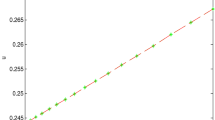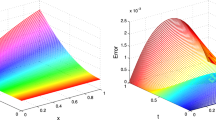Abstract
Meshless method is an effective method to solve many kinds of equations on arbitrary domains. However, previous meshless techniques, such as moving least square method, radious basis function method, and element free Galerkin method, often have complex shape functions, which make the ill-condition of the equation increase along with the adding of control points. In order to overcome above shortcomings, in this paper, we construct a new meshless method for solving nonlinear variable order fractional Ginzburg–Landau equation. The method uses the bases of bicubic spline space as shape functions and applies continuation technique to make the operation simple and the calculation accelerated. Eventually, numerical examples demonstrate that our method can obtain higher accuracy and efficiency even though the step size is larger than other methods.










Similar content being viewed by others
References
Aranson, I.S., Kramer, L.: The world of the complex Ginzburg–Landau equation. Rev. Mod. Phys. 74, 99–143 (2002)
Osman, M.S., Ghanbari, B., Machado, J.A.T.: New complex waves in nonlinear optics based on the complex Ginzburg–Landau equation with Kerr law nonlinearity. Eur. Phys. J. Plus 134, 20 (2019)
Fang, J.J., Mou, D.S., Wang, Y.Y., Zhang, H.C., Dai, C.Q., Chen, Y.X.: Soliton dynamics based on exact solutions of conformable fractional discrete complex cubic Ginzburg–Landau equation. Results Phys. 20, 103710 (2021)
Yang, Y., Shu, J., Wang, X.: Wong–Zakai approximations and random attractors of non-autonomous stochastic discrete complex Ginzburg–Landau equations. J. Math. Phys. 62, 062701 (2021)
Ouahid, L., Owyed, S., Abdou, M.A., Alshehri, N.A., Elagan, S.K.: New optical soliton solutions via generalized Kudryashov’s scheme for Ginzburg–Landau equation in fractal order. Alex. Eng. J. 60, 5495–5510 (2021)
Kong, L.H., Luo, Y.Y., Wang, L., Chen, M., Zhao, Z.: HOC-ADI schemes for two-dimensional Ginzburg–Landau equation in superconductivity. Math. Comput. Simul. 190, 494–507 (2021)
Liu, B., Bo, W., Liu, J.D., Liu, J., Shi, J.L., Yuan, J.H., He, X.D., Wu, Q.: Simple harmonic and damped motions of dissipative solitons in two-dimensional complex Ginzburg–Landau equation supported by an external V-shaped potential. Chaos Solitons Fract. 150, 111126 (2021)
Aguareles, M., Chapman, S.J., Witelski, T.: Dynamics of spiral waves in the complex Ginzburg–Landau equation in bounded domains. Physica D 414, 132699 (2020)
Khan, Y.: Fractal modification of complex Ginzburg–Landau model arising in the oscillating phenomena. Results Phys. 18, 103324 (2020)
Yan, Y., Liu, W., Zhou, Q., Biswas, A.: Dromion-like structures and periodic wave solutions for variable-coefficients complex cubic–quintic Ginzburg–Landau equation influenced by higher-order effects and nonlinear gain. Nonlinear Dyn. 99, 1313–1319 (2020)
Djoko, M., Tabi, C.B., Kofane, T.C.: Effects of the septic nonlinearity and the initial value of the radius of orbital angular momentum beams on data transmission in optical fibers using the cubic–quintic–septic complex Ginzburg–Landau equation in presence of higher-order dispersions. Chaos Solitons Fract. 147, 110957 (2021)
Coskun, E.: On the properties of a single vortex solution of Ginzburg–Landau model of superconductivity. Physica A 568, 125731 (2021)
Chu, Y., Shallal, M.A., Mirhosseini-Alizamini, S.M., Rezazadeh, H., Javeed, S., Baleanu, D.: Application of modified extended Tanh technique for solving complex Ginzburg–Landau equation considering Kerr law nonlinearity. Comput. Mater. Continua 66, 1369–1378 (2021)
Gavish, N., Kenneth, O., Keren, A.: Ginzburg–Landau model of a Stiffnessometer-A superconducting stiffness meter device. Physica D 415, 132767 (2021)
Caputo, M., Fabrizio, M.: A new definition of fractional derivative without singular kernel. Progr. Fract. Differ. Appl. 1, 1–13 (2015)
Atangana, A., Baleanu, D.: New fractional derivatives with nonlocal and non-singular kernel: theory and application to heat transfer model. Therm. Sci. 20, 763–769 (2016)
Bedi, P., Kumar, A., Khan, A.: Controllability of neutral impulsive fractional differential equations with Atangana–Baleanu–Caputo derivatives. Chaos Solitons Fract. 150, 111153 (2021)
Yadav, S., Pandey, R.K., Shukla, A.K.: Numerical approximations of Atangan–Baleanu Caputo derivative and its application. Chaos Solitons Fract. 118, 58–64 (2019)
Pho, K.H., Heydari, M.H., Tuan, B.A., Mahmoudi, M.R.: Numerical study of nonlinear 2D optimal control problems with multi-term variable-order fractional derivatives in the Atangana–Baleanu–Caputo sense. Chaos Solitons Fract. 134, 109695 (2020)
Arfan, M., Alrabaiah, H., Rahman, M.U., Sun, Y.L., Hashim, A.S., Pansera, B.A., Ahmadian, A., Salahshourj, S.: Investigation of fractal-fractional order model of COVID-19 in Pakistan under Atangana–Baleanu Caputo (ABC) derivative. Results Phys. 24, 104046 (2021)
Abdo, M.S., Abdeljawad, T., Kucche, K.D., Alqudah, M.A., Ali, S.M., Jeelani, M.B.: On nonlinear pantograph fractional differential equations with Atangana–Baleanu–Caputo derivative. Adv. Differ. Equ. 2021, 1–17 (2021)
Heydari, M.H., Hosseininia, M., Atangana, A., Avazzadeh, Z.: A meshless approach for solving nonlinear variable-order time fractional 2D Ginzburg–Landau equation. Eng. Anal. Bound. Elem. 120, 166–179 (2020)
Pandey, R.K., Yadav, S., Shukla, A.K.: Numerical approximations of Atangana Baleanu Caputo derivative and its application. Chaos Solitons Fract. 118, 58–64 (2019)
Morel, J.M., Takens, F., Teissier, B.: The Analysis of Fractional Differential Equations. Lecture Notes in Mathematics. Springer, Berlin (2004)
Li, X.L., Li, S.L.: A linearized element-free Galerkin method for the complex Ginzburg–Landau equation. Comput. Math. Appl. 90, 135–147 (2021)
Fei, M.F., Huang, C.M., Wang, N., Zhang, G.Y.: Galerkin-Legendre spectral method for the nonlinear Ginzburg–Landau equation with the Riesz fractional derivative. Math. Methods Appl. Sci. 44, 2711–2730 (2019)
Zhang, L., Zhang, Q.F., Sun, H.W.: Exponential Runge–Kutta method for two-dimensional nonlinear fractional complex Ginzburg–Landau equations. J. Sci. Comput. 83, 59 (2020)
Zhang, Q.F., Hesthaven, J.S., Sun, Z.Z., Ren, Y.Z.: Pointwise error estimate in difference setting for the two-dimensional nonlinear fractional complex Ginzburg–Landau equation. Adv. Comput. Math. 47, 35 (2021)
Zhang, L., Zhang, Q.F., Sun, H.W.: A fast compact difference method for two-dimensional nonlinear space-fractional complex Ginzburg–Landau equations. J. Comput. Math. 39, 708–732 (2021)
Zhang, M., Zhang, G.F.: Fast iterative solvers for the two-dimensional spatial fractional Ginzburg–Landau equations. Appl. Math. Lett. 121, 107350 (2021)
Zhang, Q.F., Zhang, L., Sun, H.W.: A three-level finite difference method with preconditioning technique for two-dimensional nonlinear fractional complex Ginzburg–Landau equations. J. Comput. Appl. Math. 389, 113355 (2021)
Shokri, A., Bahmani, E.: Direct meshless local Petrov–Galerkin (DMLPG) method for 2D complex Ginzburg–Landau equation. Eng. Anal. Bound. Elem. 100, 195–203 (2019)
Mu, L., Du, H.: The solution of a parabolic differential equation with non-local boundary conditions in the reproducing kernel space. Appl. Math. Comput. 202, 708–714 (2008)
Xie, S.S., Heo, S., Kim, S., Woo, G., Yi, S.: Numerical solution of one-dimensional Burgers’ equation using reproducing kernel function. J. Comput. Appl. Math. 214, 417–434 (2008)
Fardi, M., Ghasemi, M.: Solving nonlocal initial-boundary value problems for parabolic and hyperbolic integro-differential equations in reproducing kernel hilbert space. Numer. Methods Partial Differ. Equ. 33, 174–198 (2017)
Prenter, P.M.: Splines and Variational Methods. Courier Corporation, Chelmsford (2008)
Shi, L., Chen, Z., Ding, X.H., Ma, Q.: A new stable collocation method for solving a class of nonlinear fractional delay differential equations. Numer. Algorithms 85, 1123–1153 (2020)
Adams, R.A.: Sobolev Spaces. Academic Press, Heidelberg (2002)
Han, W.M., Meng, X.P.: Error analysis of the reproducing kernel particle method. Comput. Methods Appl. Mech. Eng. 190, 6157–6181 (2001)
Carlson, R.E., Hall, C.A.: Error bounds for bicubic spline interpolation. J. Approx. Theory 7, 41–47 (1973)
He, J.H.: Homotopy perturbation method for solving boundary value problems. Phys. Lett. A. 350, 87–88 (2006)
Du, H., Chen, Z., Yang, T.J.: A stable least residue method in reproducing kernel space for solving a nonlinear fractional integro-differential equation with a weakly singular kernel. Appl. Numer. Math. 157, 210–222 (2020)
Xu, Q., Chang, Q.: Difference methods for computing the Ginzburg–Landau equation in two dimensions. Numer. Methods Partial Differ. Equ. 27, 507–528 (2011)
Shokri, A., Dehghan, M.: A meshless method using radial basis functions for the numerical solution of two-dimensional complex Ginzburg–Landau equation. Comput. Model Eng. Sci. 84, 333–358 (2012)
Shokri, A., Afshari, F.: High-order compact ADI method using predictor–corrector scheme for 2d complex Ginzburg–Landau equation. Comput. Phys. Commun. 197, 43–50 (2015)
Author information
Authors and Affiliations
Corresponding author
Additional information
Publisher's Note
Springer Nature remains neutral with regard to jurisdictional claims in published maps and institutional affiliations.
Rights and permissions
About this article
Cite this article
Li, L., Chen, Z. A meshless method for solving nonlinear variable-order fractional Ginzburg–Landau equations on arbitrary domains. J. Appl. Math. Comput. 68, 3937–3959 (2022). https://doi.org/10.1007/s12190-021-01691-x
Received:
Revised:
Accepted:
Published:
Issue Date:
DOI: https://doi.org/10.1007/s12190-021-01691-x




